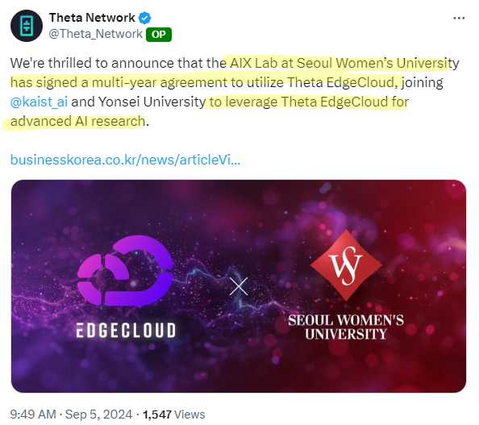Theta Labs, the leading decentralized cloud for AI, media and entertainment, is excited to announce that AIX Lab at Seoul Women’s University has signed a multi-year agreement to utilize Theta EdgeCloud, joining KAIST AI and Yonsei University to leverage Theta EdgeCloud for advanced AI research.
Theta EdgeCloud, known as an innovative hybrid cloud-edge computing AI platform, is powered by the Theta Edge Network with over 30,000 distributed edge nodes, and cloud partners including Google Cloud and Amazon Web Services offering over 80 PetaFLOPS of always available distributed GPU compute power. This partnership is poised to significantly enhance the research capabilities of SWU’s AI to Everything Lab.
The partnership between Theta Edgecloud and SWU is yet another example of decentralized physical infrastructure networks (DePIN) solving real-world problems, leveraging web3 infrastructure and token incentives to improve and augment already existing technologies.
Seoul Women's University (SWU) is a prestigious private university in Seoul, South Korea, consistently ranked among the top institutions for women's education in the country. The AI to Everything (AIX) Lab is dedicated to applying artificial intelligence across various domains, including healthcare, bioinformatics, and industry-specific innovations. The lab focuses on integrating AI with real-world applications to address complex challenges in various fields, utilizing cutting-edge techniques in machine learning, deep learning, and data analytics.
The collaboration between Seoul Women’s University’s AIX Lab and Theta will be led by Professor Minseo Park, assistant professor at SWU’s Department of AI and an adjunct professor at the College of Business of KAIST, a prestigious South Korean research university.
Professor Minseo Park's research focuses on applying artificial intelligence in healthcare, bioinformatics, marketing, and industry-specific applications. She specializes in leveraging machine learning and deep learning to develop innovative solutions for complex challenges, particularly in medical AI, chronic disease management, and bioinformatics, as well as exploring AI's potential in education, marketing, real estate, finance and sports industries.
This partnership is particularly significant as it follows recent multi-year agreements with KAIST and Yonsei University, highlighting Theta EdgeCloud's competitive advantage providing cost-effective, easy to use, high-performance distributed GPU computing.
Academia AI research labs tend to be cost sensitive and often build in-house GPU server clusters utilizing NVIDIA 3090/4090s. These homegrown infrastructures are typically costly to maintain and manage, difficult to scale over time, and distracts current PhD research students with DevOps and IT infrastructure responsibilities. Additionally, these research labs utilize cloud providers such as AWS and Microsoft Azure for time critical AI training in order to meet research paper deadlines, and pay premium pricing for on-demand GPU, in many cases 2-3x the price offered by Theta EdgeCloud.
Academic institutions also gravitate towards using publicly available datasets for training open source AI models, leveraging for example, Meta’s latest Llama 3.1 large language model, Stable Diffusion’s genAI text-to-image, text-to-video models and more. They in turn share their contributions, fine-tuned models and open-source datasets with the wider research community. This research community driven, sharing philosophy matches Theta’s decentralized, open-source blockchain approach perfectly, with over 30,000 community members sharing their desktop and gaming PC GPUs forming the Theta edge network collective.
"The partnership between AIX Lab at Seoul Women's University and Theta Labs represents a significant step in democratizing AI research," said Professor Park. "As the Web3 ecosystem evolves, platforms like Theta EdgeCloud are bridging the gap between academic ambitions and practical constraints. Our work at AIX Lab, which spans healthcare to finance, demands substantial computational power that was previously cost-prohibitive. Theta's decentralized GPU network not only provides the scalability we need but also aligns with the open-source ethos of academia. By tapping into this shared resource, our students and academic team are able to focus on pushing the boundaries of AI applications without restraint.”
“We're thrilled to welcome Professor Minseo Park and the AIX Lab at Seoul Women's University to our growing network of academic partners," said Mitch Liu, co-founder and CEO of Theta Labs. "This collaboration exemplifies how DePIN platforms like Theta EdgeCloud with thousands of desktop NVIDIA 3090/4090 GPUs can deliver tangible benefits in the real world. By leveraging EdgeCloud, academic labs like AIX can compete head-to-head with commercial AI powerhouses, dramatically reducing costs while accelerating their research in big data analytics, machine learning, and deep learning. It's not just about technology; it's about democratizing AI research and ensuring that brilliant minds in academia have the tools they need to push the boundaries of innovation.”













 All while Pfizer—a company with a $2.3 billion criminal fine for fraudulent marketing, bribery, and kickbacks—was given blanket immunity from liability and billions in taxpayer dollars to produce a vaccine in record time with no long-term safety data.
All while Pfizer—a company with a $2.3 billion criminal fine for fraudulent marketing, bribery, and kickbacks—was given blanket immunity from liability and billions in taxpayer dollars to produce a vaccine in record time with no long-term safety data.
























